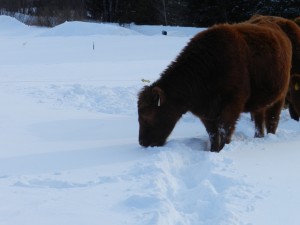 It’s gotten to the point where I can almost predict the reaction from folks when I tell them we don’t water our cows in the winter time.
It’s gotten to the point where I can almost predict the reaction from folks when I tell them we don’t water our cows in the winter time.
“You what?”
“No water – just snow?”
“Really?”
“Boy, you’re tough on your cows!”
“How does that work?”
It makes me smile every time, but I tell them that despite their concerns, studies have shown that non-lactating cows can get by just fine in wintertime without stockwater – as long as they have an abundant supply of snow. Fortunately for us, snow is one thing northern Maine winters have no shortage of!
The Cattle Water Problem
We started using snow as a cattle water source by way of necessity. After a couple weeks of dried up springs and freezing water troughs, we realized it wasn’t going to be feasible to provide consistent water for 10 cows on a daily basis when the temperatures don’t get above freezing for months at a time. Hauling water was going to be a daunting chore, and keeping an electric heating element in the tank would be very costly – some estimates put the electricity costs at over $1,000/year to keep the water heated!
Like many farming problems, this one could be solved by money, with a developed spring, frost-free nose pump, or a drilled well with pressurized underground piping to a waterer. But we didn’t have the thousands of dollars for those solutions, so we researched and hoped for a better solution.
Research on Snow as a Water Source
Since Maine has abundant snow in the winter time, it made perfect sense to have the cows eat snow, but was it a feasible solution, and would it affect the health and performance of our cows? We turned to scientific research for guidance.
Here’s what we found:
From Utah State University:
Many wonder if cows can eat snow in the winter to supply all their water needs. The answer is yes. There are many situations where cattle can survive on snow without having any other water supply. Many ranches throughout the West and Midwest with cattle on large pastures and few or no water resources depend entirely on snow for winter grazing.
Several studies have shown there is no reason to expect cattle performance to deteriorate when animals use snow for water. Researchers found cows using snow for water did not differ in live weight amount of body fat compared to cows receiving water.
From Alberta Agriculture and Rural Development:
Cattle do well when snow is their only water source, as long as there is adequate snow present, and it is not hard or crusted over. It is important to monitor cow and snow condition on a daily or second day basis. A lack of water reduces feed intake, and cows can lose condition fairly rapidly when water is deficient. Studies in Canada have shown some cows have gone 50 to 60 days with snow as the sole water source without any adverse effects.
From Beef Magazine:
South Dakota ranchers Reuben and Connee Quinn have relied on snow in winter pastures for more than 30 years. They say cattle do well with snow as their only water source if they know how to use it and have adequate snow that’s not crusted and hard.
From Ontario Agriculture, Food and Rural Affairs:
….beef cows eating snow as a water source experience no disadvantages compared to those drinking water.
Here are some additional articles:
 Replacing Water With Clean Snow for Ewes and Beef Cows
Replacing Water With Clean Snow for Ewes and Beef Cows
Snow as a Water Source for Wintering Beef Cattle
Utilizing Snow as a Water Source
The Results
Overall, we were pleased to see the overwhelming support for the use of snow as a water source. So we tried it. And it worked! All winter long, our cows ate snow and did well on it. While we realize the importance of regular monitoring of cow condition, snow intake and snow quality, we are happy to take advantage of the abundant snow and look forward to another water-trough free winter!

Leave a Reply